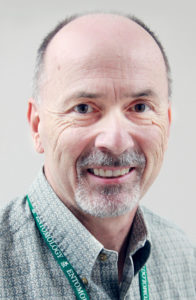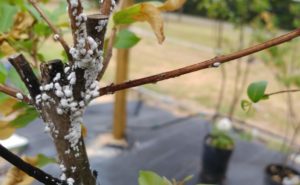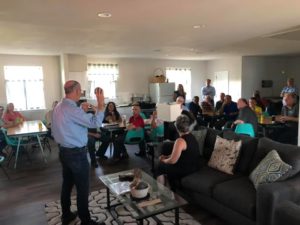 The Department of Entomology and Texas A&M AgriLife Extension Service celebrated the retirement of a longtime professor and Extension Entomologist during a virtual celebration held on August 7.
The Department of Entomology and Texas A&M AgriLife Extension Service celebrated the retirement of a longtime professor and Extension Entomologist during a virtual celebration held on August 7.
Merchant, a Professor and Extension Entomologist in Dallas, will be retiring on August 31. He has been with Extension for more than 30 years when he joined as an Urban Entomologist in the District 4 offices located in the Dallas area.
His career highlights started in 1993 when Merchant was named Chair of the statewide School IPM Advisory Committee. As chair, Merchant served as principal drafter of the original regulations establishing the Texas School IPM program. Since then, he has created video training tapes and wrote a handbook for school IPM coordinators, and a training conference.
In 2001, Merchant and Program Leader and Extension Specialist Dr. Don Renchie were awarded a multi-state grant in to develop the Southwestern Technical Resource Center for IPM in Schools and Daycare Facilities. The grant also allowed Merchant to hire Extension Program Specialist Janet Hurley to help create the Texas School IPM Team, which gained national recognition for their outstanding work developing training materials and courses in integrated pest management for schools.
In the early 1990’s Merchant was the author of the original fact sheet for the “Texas Two-Step” method of controlling fire ants that was developed by the Texas A&M AgriLife Extension Service. The sheet was the most frequently requested publication from 1995-1997 and is now being used by commercial fire ant bait manufacturers and is recognized as the most effective control program available in the nation.

Crepe myrtle bark scale
Over the past decade, Merchant led a team of entomologists to identify a new insect pest of crape myrtle, officially named the crape myrtle bark scale or Eriococcus lagerstroemiae. The scale has now spread throughout the southern U.S. Merchant demonstrate that neonicotinoid soil drenches controlled the scale, and his research has focused on safe and effective methods of control that are also safe, economically feasible, and do not adversely impact pollinators who use crape myrtle as a source of pollen in the late summer.
In 2003, Merchant along with colleagues Drs. John Jackman and Carlos Bogran developed the Master Volunteer Specialist in Entomology program. This training consists of a course which offers in-depth training in entomology to Master Gardeners and Master Naturalists and created an online outreach tool for professionals and general public called Insects in the City. He also oversaw the renovation project in 2016 that eventually became the Texas IPM House, which is a hands-on training facility for pest management professionals to learn about IPM and pests that invade homes or used structures as a source of food and shelter.
Merchant also created an interactive website called “Mosquito Safari” to help teach homeowners and businesses about proper mosquito control. During the emergence of the Zika virus, Merchant worked with Dr. Sonja Swiger to develop a statewide outreach program to educate about controlling mosquitoes and prevention of Zika in Texas. In 2016, they enlisted the help of several Extension agents, specialists, and program specialists to create and distribute materials.

Mike Merchant training a class at the IPM Experience House
Their efforts in mosquito control educational programming resulted in 339 education events, directly training nearly 140,000 people plus over 2 million media contacts engaged with the programs. In addition, 76,400 people received newsletters with Zika information and more than 11,000 printed copies were distributed throughout the state.
Since 1995, Merchant has also maintained another highly popular website called Insects In The City, or citybugs.tamu.edu, that allows visitors to sign up for insect updates, post questions, and view fact sheets. The site receives at least 1.2 to 1.5 million visitors and an average of 3.2 million views per year.
In addition to Extension, Merchant was very active in the Entomological Society of America where he made significant contributions through his service, including co-authoring a 208-page study guide Associate Certified Entomologist program titled IPM for the Urban Professional: A Study Guide for the Associate Certified Entomologist.
Merchant also served on the Entomological Society of America’s Certification Board, a board that is responsible for the Society’s certification programs, and the Director of the BCE program in 2001-2002. Since he was director of the BCE, he led the reorganization of the program committee and established the Associate Certified Entomologist program.
Extension Program Specialist Wizzie Brown said that Merchant will definitely be missed by everyone.
“Mike has been an excellent mentor over the years and will be sorely missed by myself, other entomologists, and people within the pest control industry,” Brown said.
“Dr. Merchant has always been some whom I could depend on whenever I had a question or an issue,” Associate Professor and Extension Specialist Dr. Sonja Swiger said. “He has provided guidance, wisdom, compassion and steadfast for all of us in the Extension Entomology group. While his retirement is well deserved, he will be deeply missed by all.”